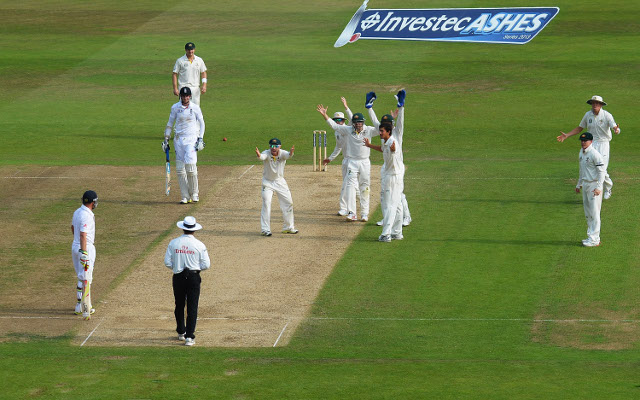Stuart Broad’s non-dismissal dominated conversion heading into day four.
During the infamous Bodyline series that upon witnessing Douglas Jardine’s tactics of viciously bowling around the wicket that Australian captain Bill Woodfull said to England manager Plum Warner: “There are two teams out there; one is trying to play cricket and the other is not.”
While such language has not been used by anybody in the wake of the Stuart Broad non-dismissal on day three, the feeling has certainly been there from some quarters.
Ex-players, media and fans have all had their say about what is one of the greyest areas of the sport.
To walk or not to walk.
This much the cricket public can be certain of – Stuart Broad did get an edge off the bowling of Ashton Agar and Michael Clarke did take the catch at first slip after a deflection from the glove of Brad Haddin.
Umpire Aleem Dar did remain unmoved at the non-striker’s end and the fall-out will continue well past the final ball of the first Test match at Trent Bridge.
There are two schools of thought stemming from the incident – that the umpire is there to give you out and until he does so then you are well within your right to stand your ground.
However, this may seem like being caught red-handed shop-lifting but pleading your innocence because a judge is not there on the spot to bang the gavel for your sentence.
The second ideal is that by not admitting guilt and owning up when he was clearly out, Broad will be branded a cheat for the rest of the series, and possibly, his career if he is involved with any other contentious issues.
Much of the anger and debate stems from the fact that cricket is still seen as a gentleman’s game and that the integrity of its players is held in a higher regard than many other sports around the world.
Former Australian wicketkeeper Adam Gilchrist was the most recent and famous modern incarnation of a player who walked before the umpire’s decision when he knew he had nicked a ball to a fielder.
At the time of his first stand for what he believed was the right thing to do, Gilchrist like Broad, was both praised and criticised.
While some at the time believed he would be harming his team’s chances of winning if he chose to make a stand, in say, a World Cup final or fifth and deciding Test match, overall his long-lasting appeal has not been affected for his decision.
It must be remembered that 99 per cent of players in world cricket do no walk, those who do are the exception, not the written rule.
But the fact that Broad was so clearly out is the reason why the debate has been re-ignited.
Ask yourself, ethically is there any difference between if Broad got a feather edge or a thick one as he did?
The unspoken, and to some extent, biggest player in this debate is unable to speak up for itself – the DRS.
While it continues to be a contentious piece of technology in the game, it does still have the ability to stop bad decisions being made.
Australia are in part to blame for this debate reaching the point it has, with their decision to use a frivolous appeal before lunch on day three, denying them the chance to send the Broad dismissal upstairs for further review.
Expanding the power of the third umpire would be almost impossible, given some countries – India – are against the use of the DRS in the game at all
If the man upstairs was able to radio to Dar that perhaps the appeal should be looked at if there is clear evidence a mistake has been made, the debate would be over.
However, the likelihood this would have would be slim as many would see it as placing too much power in the hands of officials.
At the end of the day, the number of incidences where the integrity of a player and the game in relation to non-dismissals is questioned are rare.
But they happen often enough, and in this case, it has detracted from what has already been three thrilling days Test cricket with plenty more to come.


COMMENTS